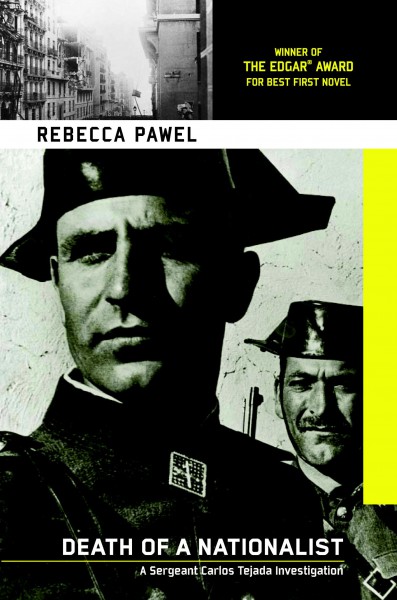In my first guest post, I wrote about mystery series that I felt had "jumped the shark" and outlived their original promise. I gave some examples and readers submitted more series in the comments section. Now I'd like to write about mystery series that ended, but still had plenty of "oomph" in them. Again, the examples are mine and I do expect some disagreement.
 I'll start with a series I enjoyed 10 or so years ago. Young author Rebecca Pawel came up with a marvelous series set in Franco's Spain, right after the bloody Civil War. The first in the four-book series is Death of a Nationalist. Pawel's lead character, Madrid policeman Carlos Tejada, is part of the Nationalist Guardia Civil who finds himself investigating a murder of a suspected Republican. (Republicans, also called Loyalists, were loyal to the Spanish Republic, while Nationalists, led by Francisco Franco, overthrew the Republic in favor of an authoritarian regime.)
I'll start with a series I enjoyed 10 or so years ago. Young author Rebecca Pawel came up with a marvelous series set in Franco's Spain, right after the bloody Civil War. The first in the four-book series is Death of a Nationalist. Pawel's lead character, Madrid policeman Carlos Tejada, is part of the Nationalist Guardia Civil who finds himself investigating a murder of a suspected Republican. (Republicans, also called Loyalists, were loyal to the Spanish Republic, while Nationalists, led by Francisco Franco, overthrew the Republic in favor of an authoritarian regime.)Tejada's investigation reveals a case much more complicated than a plain murder, and political ambiguities begin to appear. Rebecca Pawel is very daring in her use of a Nationalist as the protagonist, rather than a more conventionally sympathetic Republican. She continued her strong writing in three more books, the final one published in 2006.
And then Pawel stopped; nothing more since then other than an "Amazon single" e-book. I check the Soho Press catalog yearly to see if anything else is on the horizon, but . . . nada. (There was also a Tejada "single" self-published, which was disappointing, perhaps because it wasn't long enough to make much sense.)
One of my favorite authors is Rita Mae Brown. Now, I am a cat lover and am owned by two cats, but I don't read Brown's cozy series starring the tabby cat Sneaky Pie. I tend to be cozy-averse, but I do read her heavier series, set in Virginia and starring “Sister” Jane Arnold of the Jefferson Hunt Club. Brown, who is a Master of her Virginia hunt club, fills her books with dog breeding, horsemanship, local politics, and . . . murder. Usually, the culprits are easily teased out before the book's end, but her Sister Jane books are great fun. As I wrote in my first post, I love returning with an author to accompany old friends on new adventures. And so it is with Sister Jane and her crew, both human and animal. However, there are no new books in the offing.
(Also, and regrettably, Brown wrote two books set in Nevada; mysteries starring Magdalene “Mags” Rogers and her dogs, which I consider two of the worst-written books ever. Real stinkeroos, completely lacking Brown's usual strong sense of place and colorful, interesting characters. Don't buy them; don't read them. I'd like to forget that I ever did read them.)
Another police procedural/mystery writer I'm waiting for a new book from is Joseph Wambaugh. One of the best and toughest writers I've read, his four-book Hollywood Station cop-shop books are some of my all-time favorites. There really are no plots, to speak of, but his characters are brilliantly written. I'd love to return to Hollywood Station . . . but nothing new is forthcoming.
British psychologist Frank Tallis has written six books set in Vienna in the early 1900s. Starring Max Liebermann as a young psychoanalyst, and Oscar Reinhardt as a police detective, they team up to solve crimes that have baffled the Viennese authorities. The two are occasionally aided by Dr Sigmund Freud, who is mentoring Max Liebermann.
This is one of those series where you have to watch out for books having different titles in the UK and US. My concern is that it’s been a couple of years since the last book in the series, and the author's website appears to have been deactivated. I miss the Liebermann and Reinhardt characters, who use psychological know-how to solve crimes. I wish I could do the same to figure out whether and when they’ll reappear.
 But along the same lines of the Frank Tallis Max Liebermann books is the new book, also set in Vienna in the early 1900s, by Richard Lord, called The Strangler's Waltz. I'm adding it to this list because it is part of the "Vienna Noir Quartet," though only Waltz has been published to date.
But along the same lines of the Frank Tallis Max Liebermann books is the new book, also set in Vienna in the early 1900s, by Richard Lord, called The Strangler's Waltz. I'm adding it to this list because it is part of the "Vienna Noir Quartet," though only Waltz has been published to date.I sure hope Lord does continue with the series, and the remaining three books are published . . . and soon. The Strangler’s Waltz (Monsoon Books, 2013) is available in print and in e-book form, which is how I read it.
Why does an author stop writing a series? I suppose the author may have gotten bored with his characters, or the publisher sees a trend of declining sales and asks the author to try his hand at new characters. I think the five authors I've listed are all alive and presumably still able to write. The most curious example is Rebecca Pawel. She was young––in her 20s––when she wrote the Tejada books, which I felt were brilliantly conceived and written. Where is she? She had as good a future as I've seen for a young writer.
So, what series ended too abruptly for you? Give us some names.





Good morning, LJD's Ghost, nice to have you back.
ReplyDeleteA few years ago, we Material Witnesses got to know Rebecca Pawel when she participated in a book discussion with us. At that time, she was teaching high school. She concluded her wonderful Tejada series when she felt it had reached its natural ending (more on her website, http://www.rebeccapawel.com/), and Soho Crime didn't pick up her new Flemish historical fiction. I need to email her to see what she's up to these days. I hope a book is in the works.
I'm also a Joseph Wambaugh fan. Earlier this month, when asked about a new Hollywood Station book, Wambaugh said there was nothing on the horizon, but he's not one to say never. So let's keep our fingers crossed.
Frank Tallis is currently writing horror novels, taking a break from his Max Liebermann books, because he doesn't want them to become repetitive and stale.
Untimely death brought Reginald Hill's and Leighton Gage's series to too abrupt conclusions. A change in priorities ended Dorothy L. Sayers's Lord Peter books; I wish she'd written more. Michael Malone hasn't written a new book about his mismatched North Carolina cops, Justin Savile and Cuddy Mangum, in more than 10 years. I like this three-book series because it focuses on the cultural and social issues of a small town in that state.
Should we mention sequels we're waiting for? Lenny Kleinfeld's SHOOTERS AND CHASERS is a hugely entertaining book that sends a pair of Chicago cops to Los Angeles. Maybe we'll see a sequel next year.
Thanks for the updates, Georgette, particularly about Pawel. I'm going to have to look at Kleinfeld's novel.
ReplyDeleteLJDG, great blog with food for thought. I expect Jo Nesbø to lower the boom on poor Harry Hole any day now and then it will be a series that ended before I was ready to say goodbye. I loved Paul Mann's George Sansi books, set in India. The third (and last) was published in 1996. I don't know why there aren't any more.
ReplyDeleteI've been missing new crime fiction featuring Havana police inspector Mario Conde by Cuban writer Leonardo Padura. The last one was published in 2005 (in the USA in 2009). That series is very interesting because it is set in Cuba, and the mentions of baseball, mouthwatering food cooking on the stove, and rich-smelling cigars send me into a swoon. In researching Padura, I see that his THE MAN WHO LOVED DOGS, a novel about the 1940 assassination of Leon Trotsky, was published last December. I can't wait to read this.
ReplyDeleteI don't expect to see any more Leo Demidov books from Tom Rob Smith, and I'm sorry about that. His THE FARM, due out this June, is a contemporary thriller set in Sweden and features the kidnapping of a young girl.
One of the many blessings of being a book collector with a flexible memory is that if I really miss a series I can just read it again. I also enjoyed Rebecca Powell’s series and will reread it from the beginning soon. Another of the great series that I have read more than once is Michael Allen Dymmoch’s five book series that featured Jack Caleb, a psychiatrist with a practice in Chicago and John Thinnes, a cop he meets when involved in a murder case.
ReplyDeleteI was drawn to the series by the title of the first book THE MAN WHO UNDERSTOOD CATS. Another was the short series by Kate Ross who died shortly after her last book from cancer. Her fascinating protagonist Julian Kestrel lived the 1820s in London and was a man about town solving crimes for the ton.
A more recent find of mine is a short series that ended too soon by Margaret Yorke that involved Patrick Grant, a professor and amateur sleuth, in Oxford, England. House of Stratus recently republished these, written in the seventies and they are very nice volumes.
Re-reading Rebecca Pawell's books sounds like a good idea, MC. They're definitely worth it. I also like Kate Ross's Julian Kestrel.
ReplyDeleteI'm ready for a re-read of Sarah Caudwell's charming Hilary Tamar books, set among a bunch of young lawyers in Oxford, England. The series, which begins with THUS WAS ADONIS MURDERED, ended much too soon with Caudwell's early death.
Michael Dibdin is another writer who left us too soon. His Italian cop, Aurelio Zen, becomes more cynical as the series proceeds to its conclusion with END GAMES in 2007. I'm getting hungry just thinking about Zen's reflections about food.
Twenty years ago, Aaron Elkins wrote a three-book traditional series featuring an art curator named Chris Norgren. He got into scrapes in Europe as he attempted to pick up paintings for his Seattle museum. I like these books because Elkins knows how to tell a story, and art fraud is always interesting.
Daniel Woodrell writes wonderful noir. THE DEATH OF SWEET MISTER and WINTER'S BONE are two standalones that people might be familiar with. I also enjoyed his old Rene Shade series, set in the bayou town of St. Bruno, Louisiana, about an ex-boxer who became a police detective. The series ended after three books.
There are too few Philip Marlowe books written by Raymond Chandler. Nobody uses words like Chandler, although Robert B. Parker made the attempt when he finished the eighth series book, POODLE SPRINGS, after Chandler's death. I'm looking forward to seeing what kind of job Benjamin Black does with Marlowe in THE BLACK-EYED BLONDE, due out in March. In a few weeks, Periphera will tell us about this book in our Spring 2014 preview.
Ha! I can't believe Georgette and I posted at the same time about Sarah Caudwell!
ReplyDeleteHmm, well, I thought we did . . .
ReplyDeleteYour comment that disappeared is a mystery, but I'm not surprised we'd both mention Sarah Caudwell. Her Oxford series is terrific fun.
DeleteThere are so many good series that as much as I'd like to reread some books, I can't spare the time. I'm hoping to write an upcoming article on Polish mysteries - yes, there are some and they're not so grim as their neighbors to the north - so I have to reread some books to be able to write intelligently (or, semi-intelligently!) about them.
ReplyDeleteBy the way, did you know that Alan Furst has a new book coming out in June called "Midnight in Europe".
Oh, and has anybody read the hardboiled WW2 novels by Ben Pastor? She has a new one coming out, too, called, "A Dark Song of Blood".
LJDG
I didn't know about either the upcoming Alan Furst or Ben Pastor. We are already keeping track of books to cover in our Summer Preview, so I've added it to the list. (Our Spring Preview will be coming in a couple of weeks.)
ReplyDeleteI have Ben Pastor's Lumen on my TBR shelf. I didn't know the author was female. So a deceptive first name, like Fred Vargas, huh?
I've only read one Pastor novel, though I have her second on my TBR table. She's - and she is a she - is a tough writer. Quite the opposite of "cozy". "Lumen" was a very good novel, but not for the weak of heart or anyone wanting a "hero" for a main character. "Martin Bora", the German Army officer is a very flawed figure. Sort of like "Inspector Monk" in the "Breslau" series. LJDG
ReplyDelete